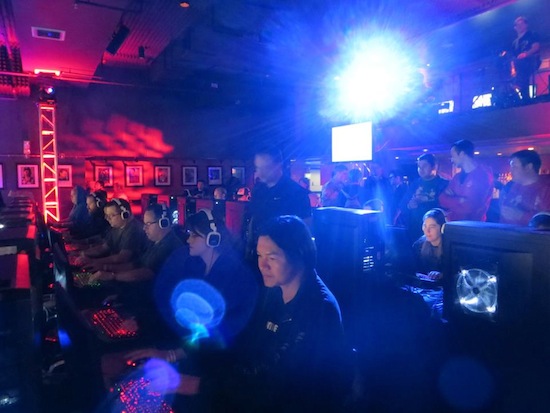Building for success
ShootMania Storm seems tailor-made for e-sports. When compared to other big multiplayer shooters, it can look a little bare: It doesn’t have a leveling or progression system, and players can only use a few weapons (everyone starts with a rocket-launcher-like gun strapped to their arms but can change loudouts via special pads found on the map). Even the look of the characters depicts a far different premise than the usual FPS — combatants look less like warriors or soldiers and more like cybernetic athletes from the future.
Just like developer Nadeo’s previous effort, the racing game TrackMania, it’s banking on the community to help keep its players engaged: Anyone can build maps using the in-game map editor. As of this writing, publisher Ubisoft claims it already has over 35,000 user-created levels.
“Certainly over the last couple of years, e-sports has had its real second coming — its renaissance — and really exploded with League of Legends and StarCraft II,” said Joshua Milligan, Ubisoft’s senior director of online strategy. “But I also think a couple other things really put ShootMania in a good spot. … FPSes in general have gotten very complicated. Lots of controls, lots of maneuvers — it’s a lot of keyboard management. And the thing with a game like this — WASD [letters on the keyboard] and a mouse — you jump in, [and] anyone can sit down and start playing.”
Wearing a customized ShootMania jersey bearing his online name (Guthwulf) and a number (666), Milligan sounded hopeful about the game’s prospects with other e-sports competitions. But whether ShootMania takes off with mainstream gamers is another question entirely.
Ubisoft has never really had an FPS strong enough to compete with Electronic Arts’s Battlefield series or Activision’s Call of Duty. And I’m not sure if ShootMania is the answer: After playing a few rounds online (once I finally found an open PC), I couldn’t help but think that maybe Nadeo focused more on delivering an exciting e-sport over an exciting game.
Watching high-level play is entertaining. The pros make near-impossible shots, react with amazingly fast reflexes, and their rivalries create the kind of tension and drama that’s usually lost in online play against strangers. But the rest of us don’t train like they do. Without the context of prize money, flashy lights, and the pageantry, ShootMania felt like a solid but forgettable shooter. I couldn’t see myself playing it for more than a few days.
Perhaps I’m wrong. The crowd at Cobb’s Comedy Club seemed genuinely excited — even if it wasn’t that packed for the finals later that Sunday — as they yelled out team names, smacked thundersticks, and chanted “U.S.A.! U.S.A.!” whenever American teams played against their European counterparts. And for the pro players who’ve already poured hundreds, if not thousands, of hours into training, they obviously want to see ShootMania spread to other e-sporting events as well.
What’s next?
Basking in the blue, white, and purple hues of the main stage, Fnatic graciously accepted their comically large $30,000 check. But once the camera flashes subsided and the applause died down, a sort of listlessness filled the venue. The players were no doubt exhausted after two full days of competition; the audience began to thin out as the stakes vanished; and other patrons, at the behest of Ubisoft representatives on the microphone, stuck around to play a little more ShootMania for fun.
“We want to be a good part of the community,” said Milligan. “Because at the end of the day, e-sports is a culture. And you don’t want to buy your way in. You don’t want to put in something that’s disingenuous. So you have to always try and find something that’s being respectful of the culture and working with it.”
With the IPL gone, Ubisoft is looking for a new partner. E-sports doesn’t have a single, unified league. Many competitive events around the world — like Major League Gaming, the World Cyber Games, and the Electronic Sports World Cup, to name a few — could serve as potential new homes for Nadeo’s shooter. And wherever the game goes, it appears that the pros, both new and old, are eager to follow.
“I know that ShootMania is gonna grow,” said Gillies. “That’s for sure. I like that we’re kind of in it early. … I just like the community as a whole, so I just want to stick with the game.”
“I hope I can keep playing this game in the future and see many more tournaments,” said Avallone. “It’s good for the game. It’s good for the community. It’s good for e-sports.”
VentureBeat's mission is to be a digital town square for technical decision-makers to gain knowledge about transformative enterprise technology and transact. Learn More


